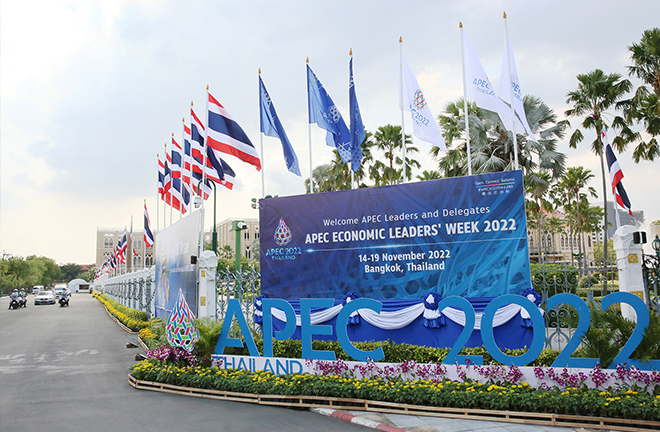China continues to play bigger role in multilateral stage

The 29th Asia-Pacific Economic Cooperation (APEC) Economic Leaders’ Meeting took place in Bangkok, Thailand on Nov. 18–19. Photo: Wang Guo’an/CNS
The 17th Group of 20 (G20) Summit was held in Bali, Indonesia on Nov.15–16, and following it, and the 29th Asia-Pacific Economic Cooperation (APEC) Economic Leaders’ Meeting took place in Bangkok, Thailand on Nov. 18–19. Chinese President Xi Jinping attended both events and conducted bilateral meetings with the leaders of several countries at their invitation. Against the backdrop of greater uncertainties in the global economy, geopolitical tensions, and hampered global governance, China has firmly been committed to upholding and practicing true multilateralism on the multilateral arena.
China’s commitment in G20 platform
As crucial platforms for international economic cooperation, both the G20 summit and the APEC meeting play an important role in international affairs. The G20 summit is defined as the topmost forum for cooperation in its field, which shows its status as a top-level mechanism in improving the global economic system. G20 members’ total GDP accounts for 85% of global GDP, their trade volumes account for over 80% of global totality, and their nations’ combined population accounts for two thirds of the world population.
The recent G20 summit had the theme of “Recover Together, Recover Stronger.” This was the first time that China’s top leader attended a multilateral summit after the successful convening of the 20th CPC National Congress. In an important speech delivered at the first session of the summit, Xi said that all G20 members should take the responsibility inherent in being major international and regional players, and should lead by example in promoting the development of all nations, improving the well-being for the whole mankind, and advancing progress of the entire world. As he pointed out, global trade, the digital economy, a green transition, and fighting corruption are key factors driving global development. In addition, food and energy security is the most pressing challenge in global development, and the?crises of the two are compounded with one another.
Making use of the G20 summit as a platform, Xi reaffirmed the importance of the Global Development Initiative and the Global Security Initiative, and announced to the world that China will be firmly committed to the path of peaceful development.
Utilizing APEC to foster Asian growth
APEC is the highest-level inter-governmental mechanism with the broadest range for economic cooperation in the Asia-Pacific region. Since its formal accession to APEC in 1991, China and other APEC members have insisted on mutually beneficial cooperation. Under the framework of the APEC mechanism, China has reaped fruitful development opportunities not seen in the past. At the same time, the growth of both China and other Asia-Pacific member countries has steered the Asia-Pacific economic integration process. Over the past 31 years, China has transitioned from a member trying to integrate itself into APEC to one guiding the institution. This change can be attributed to China’s leapfrog economic development and its belief that only mutual benefit can lead to mutual success. Herman Tiu Laurel, founder of Philippine-BRICS Strategic Studies once said that the unique status enjoyed by Asia today is largely attributed to China’s robust and peaceful development, which has helped elevate the role of the Asian region, particularly that of ASEAN.
The recent APEC meeting was held under the theme of “Open, Connect, Balance.” This meets the pressing need of the Asia-Pacific region to recover in its economy, and also the need to build an Asia-Pacific community with a shared future. As the world’s second largest economy and a member of the APEC family, China will continue to utilize APEC and other multilateral platforms and offer Chinese wisdom in fostering a more open, interconnected, green, and innovative Asia-Pacific.
Zhang Liming is from the School of International Politics and Economy at the University of Chinese Academy of Social Sciences.
Edited by BAI LE

 PRINT
PRINT CLOSE
CLOSE